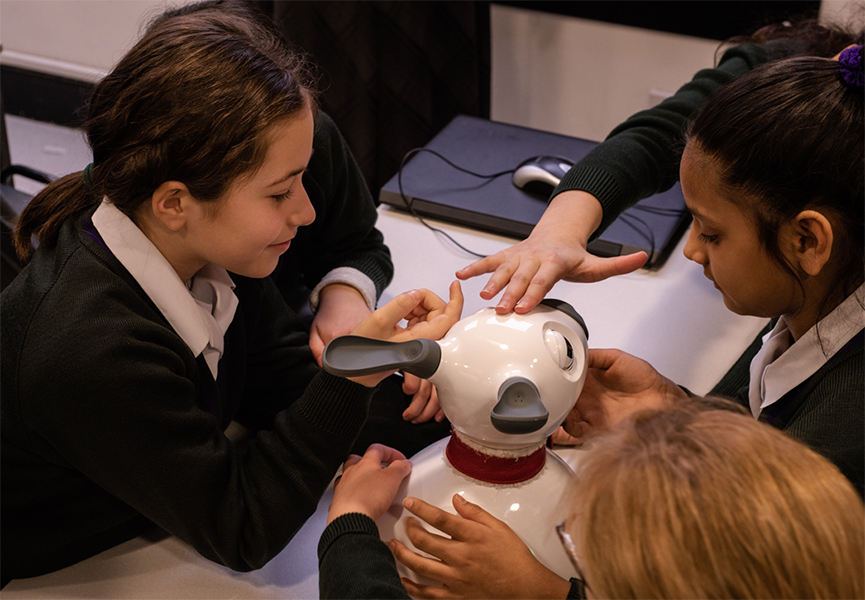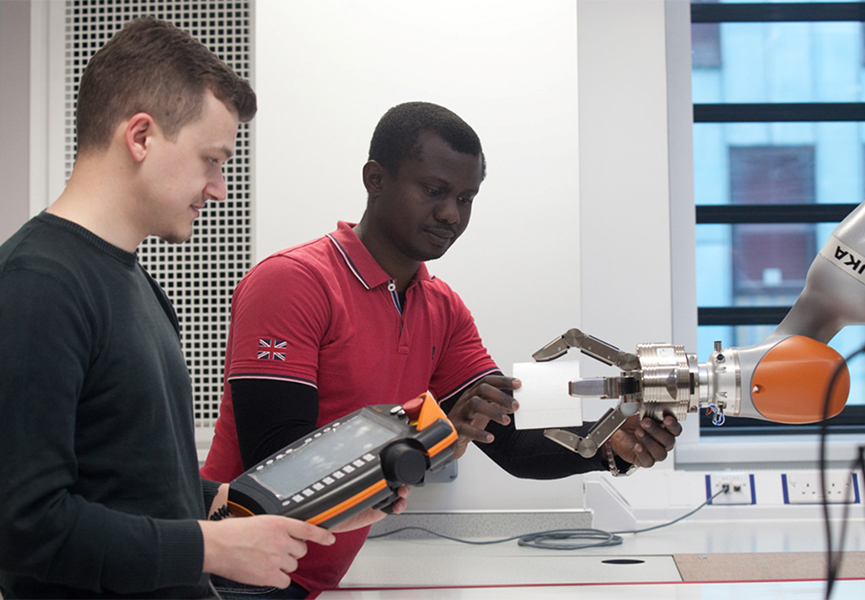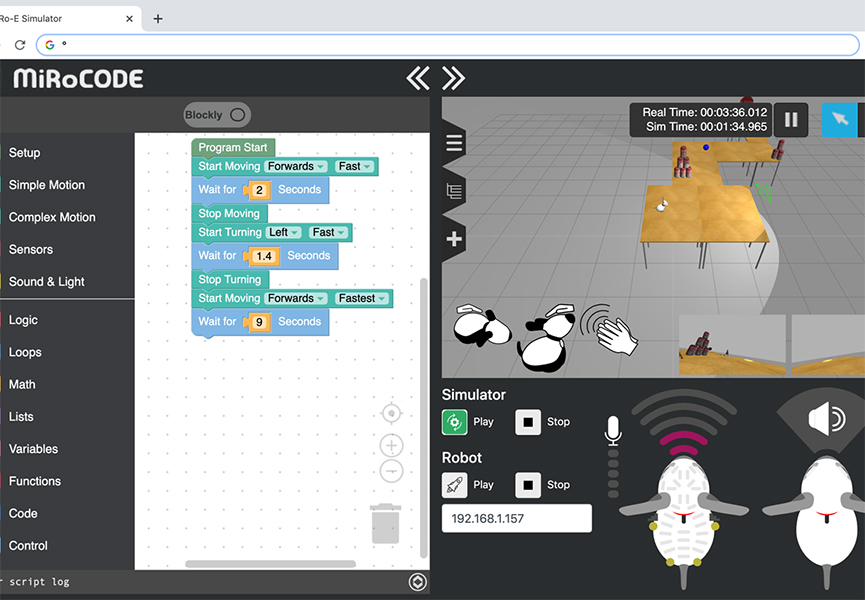Robotics distance learning project could close skills gap and boost economy
- University of Sheffield researchers launch a new distance learning project to help more people develop skills in robotics and autonomous systems.
- Project will use cloud computing and state-of-the-art robots to develop distance learning activities in robotics for people across all educational levels
- Students at all levels will pilot a new way of working where they can write programs at home and test them in simulation, then run the program on a remote robot to see if it still works in the real-world - a first for robotics teaching
- School pupils will be able to program a companion robot from home with the help of online learning resources that tests and refine their skills. Lesson plans will be developed for teachers and project will utilise diverse role models to help inspire pupils
- Apprentices and degree-level engineering students will be able to develop their skills remotely, to meet the needs of industry, with a focus on programming robotic arms for use in factory settings

A new distance learning project that will enable more people to develop skills in robotics and autonomous systems, to help close the skills gap and drive forward productivity in the UK, is being launched by researchers from the University of Sheffield.
The project, led by Professor Tony Prescott from the University of Sheffield’s Department of Computer Science, will use cloud computing and state-of-the-art robots to develop distance learning activities in robotics for people across all educational levels.
Piloting a new way of learning in robotics education, the project will enable students to write programs from home, test them using a simulation, then run the program on a remote robot to see if it works in the real-world - a first for robotics teaching.
The project will also focus on addressing inequalities in the robotics and autonomous systems industry. It will provide positive and diverse role models together with the resources needed to help young people from disadvantaged backgrounds to go on and develop the skills to study and establish a career in the industry.
With the UK economy needing to improve productivity to help recover from Covid-19 and remain competitive on an international level, the Sheffield-led team is developing a state-of-the-art robotic arm and manufacturing cell that engineering students at apprentice and degree-levels can use to develop skills in using robotics and autonomous systems in manufacturing.
Engineering apprentices at the University of Sheffield AMRC Training Centre and the University’s degree-level computer science and systems engineering students will be able to reprogramme the robotic arm and manufacturing cell remotely.
Beginners can program a robotic simulation using the graphical language Google Blockly while more advanced students can program with the widely-used Python language. Students will be able to test their programs on physical hardware, remotely and in real-time using robot platforms located at the University. This is a new approach to robotics teaching that is being piloted for the first time in Sheffield.

The project will work with the University of Sheffield Advanced Manufacturing Research Centre (AMRC) to understand the skills gap experienced by industry in the Sheffield City Region and beyond in order to develop appropriate training strategies.
Resources that will enable people outside of education to retrain and learn new skills in robotics and autonomous systems are also being developed by the researchers.
Professor Tony Prescott, Professor of Cognitive Robotics at the University of Sheffield, said: “The Covid-19 pandemic has left the UK with an urgent need to kick start its economy and boost productivity. A key to doing this will be increased automation and deploying the next generation of robotics and autonomous systems in industry.
“If we are to use more robots and autonomous systems then we need more people who have the skills to use these technologies. We need to encourage people from a young age to consider studying and developing careers in robotics while also providing the resources and the systems that will inspire young people and give them the platform they need to succeed. We also need to help the current workforce retrain and develop the skills they need to secure employment after the Covid-19 pandemic.”
For primary and secondary schools, the project will trial a cloud-based simulation of the robot MiRo - a fully programmable autonomous robotic pet - created by the University spin-out company Consequential Robotics. MiRo is currently being used across the UK and abroad to pilot new applications for robotics in education and healthcare.
The cloud-based simulation, MiRoCloud, will enable school pupils at both primary and high school levels to program a MiRo robot from home with the help of distance learning materials, tests, resources and lesson plans that are being developed by the University of Sheffield-led team.

The project is working with schools that have high numbers of children from disadvantaged backgrounds and pupils with special educational needs to help widen access to the robotics industry.
With equality and diversity being a key priority for the project, the educational resources are being developed with the aim of helping more of those who are currently under-represented in robotics to see where they can access learning opportunities and make their own contribution.
The research team will work with DiscoveryStem.org.uk, a Sheffield-based educational consultancy that is at the forefront in developing schools teaching in robotics, to develop and share learning resources with primary and secondary schools across the UK. In the Sheffield City Region, the researchers will work in partnership with Beck Primary School - a large inclusive Sheffield school.
Dr Becky Parry from the University’s School of Education is leading on ensuring the inclusivity outcomes of the project. Dr Parry said: “As a society, and in response to the rapid development of new technologies, we need new voices to help us imagine the potential value they will have to our lives. This project will be designed so that children can experience working in robotics as coders, designers or researchers and therefore imagine themselves in these roles in the future.
“The researchers and students involved in running the project will seek to provide positive and diverse role models which we know are key to children making decisions about the subjects they are interested in. In the current climate it is heartening to be part of a project which attempts to address structural inequalities in the short-term but also in terms of imagining the potential of robotics in the future to help us address the big issues of our times.”

Professor Prescott added: “We hope that the new distance learning project will help us to develop scalable approaches for plugging the skills gap, then we can work together with schools, universities, industry and policy makers to roll this out across the UK.”
The distance learning project is linked to a national task group - Skills and Education in Robotics and Autonomous Systems (www.seras.org.uk), supported by the UK EPSRC Robotics and Autonomous Systems Network, that is preparing a White Paper on how to transform the UK’s skills in robotics and autonomous systems.
Led by the University of Sheffield, the White Paper is being developed in partnership with universities across the UK, the Institute of Coding, the Royal Academy of Engineering and the National STEM Centre.
Additional information
Engineering at the University of Sheffield
Computer Science at the University of Sheffield
Automatic Control and Systems Engineering at the University of Sheffield
The University of Sheffield
With almost 29,000 of the brightest students from over 140 countries, learning alongside over 1,200 of the best academics from across the globe, the University of Sheffield is one of the world’s leading universities.
A member of the UK’s prestigious Russell Group of leading research-led institutions, Sheffield offers world-class teaching and research excellence across a wide range of disciplines.
Unified by the power of discovery and understanding, staff and students at the university are committed to finding new ways to transform the world we live in.
Sheffield is the only university to feature in The Sunday Times 100 Best Not-For-Profit Organisations to Work For 2018 and for the last eight years has been ranked in the top five UK universities for Student Satisfaction by Times Higher Education.
Sheffield has six Nobel Prize winners among former staff and students and its alumni go on to hold positions of great responsibility and influence all over the world, making significant contributions in their chosen fields.
Global research partners and clients include Boeing, Rolls-Royce, Unilever, AstraZeneca, Glaxo SmithKline, Siemens and Airbus, as well as many UK and overseas government agencies and charitable foundations.
Contact
For further information please contact:
Sean Barton
Media Relations Officer
University of Sheffield
0114 222 9852
s.barton@sheffield.ac.uk








 User Center
User Center My Training Class
My Training Class Feedback
Feedback












Comments
Something to say?
Log in or Sign up for free